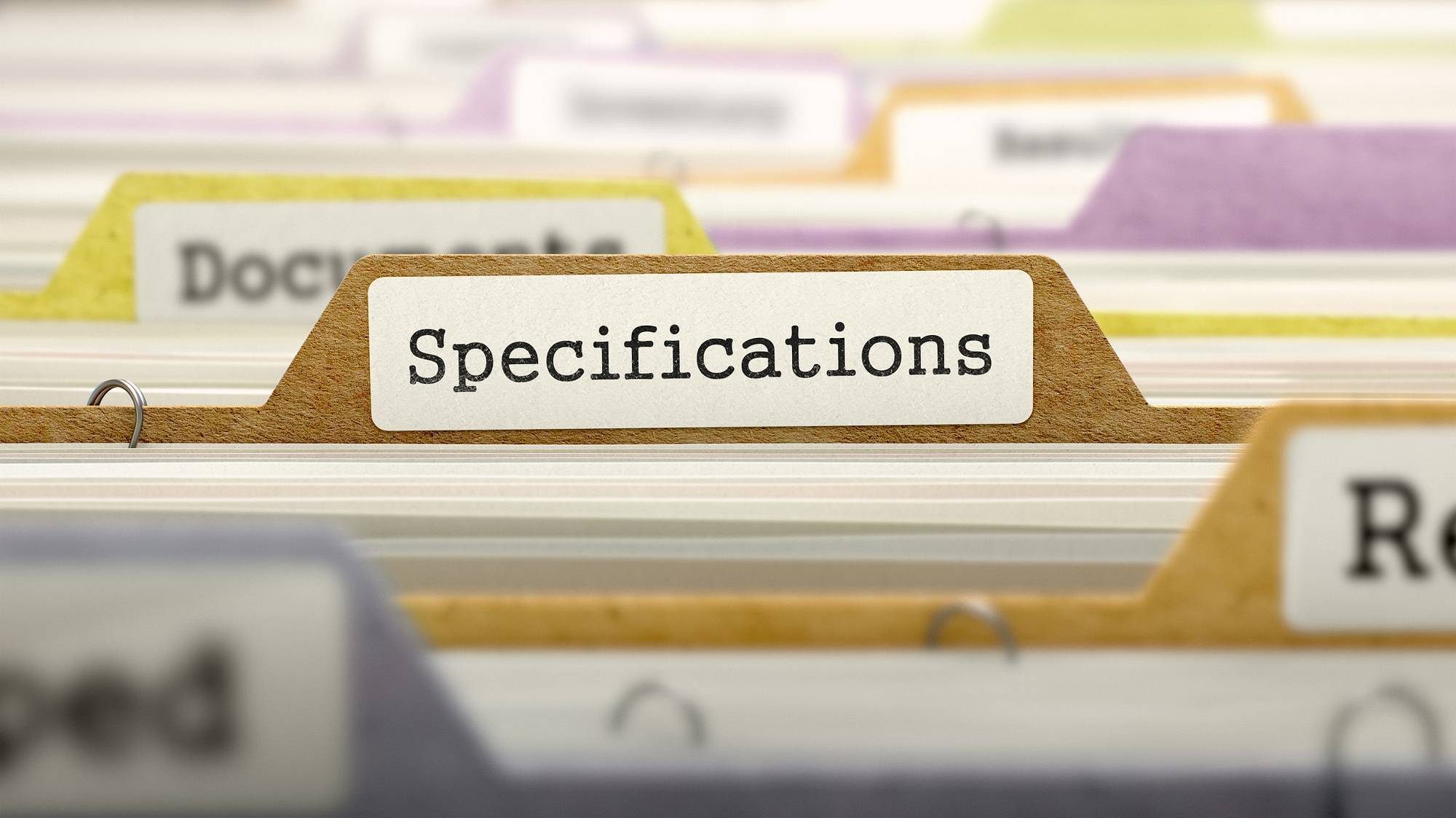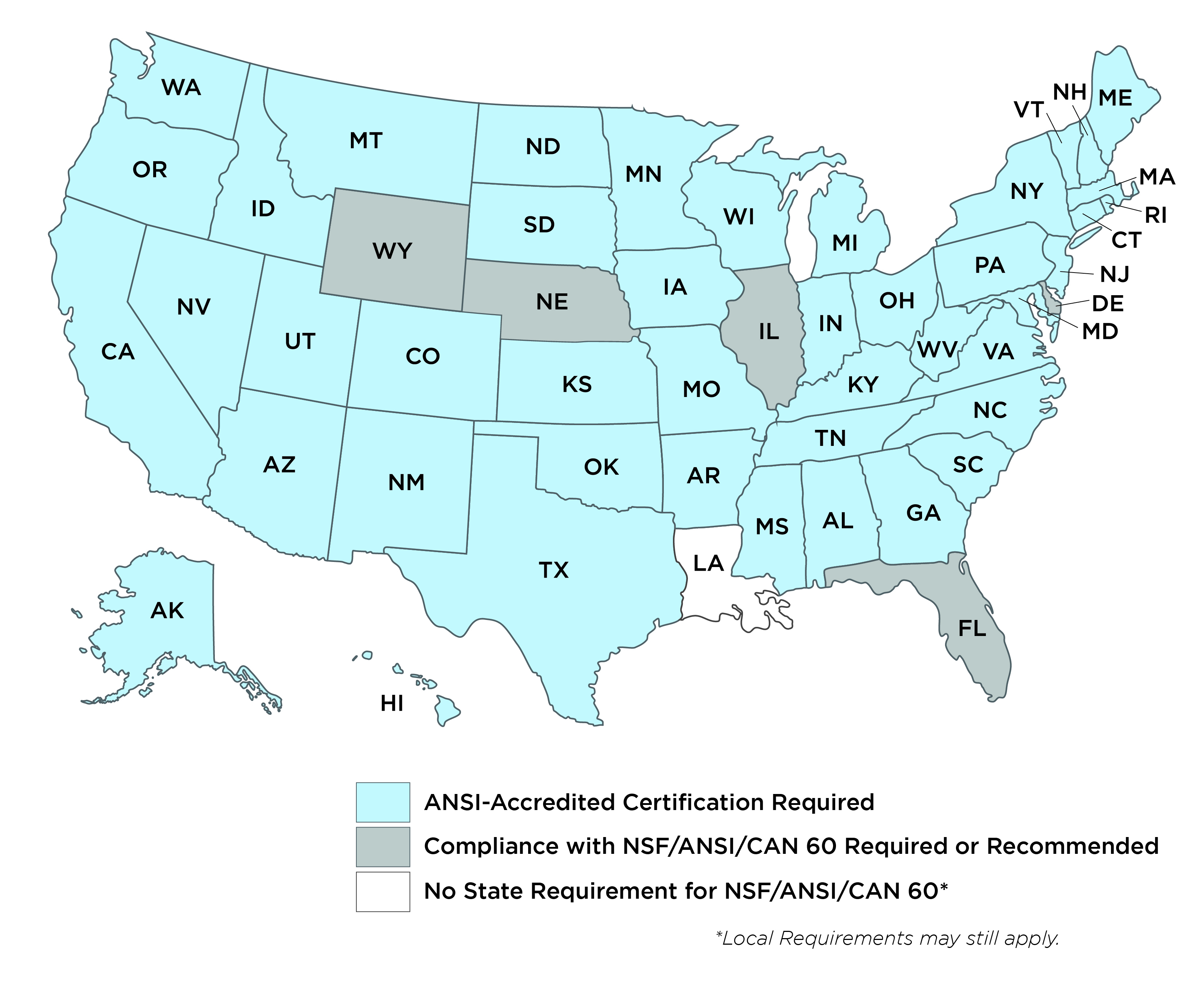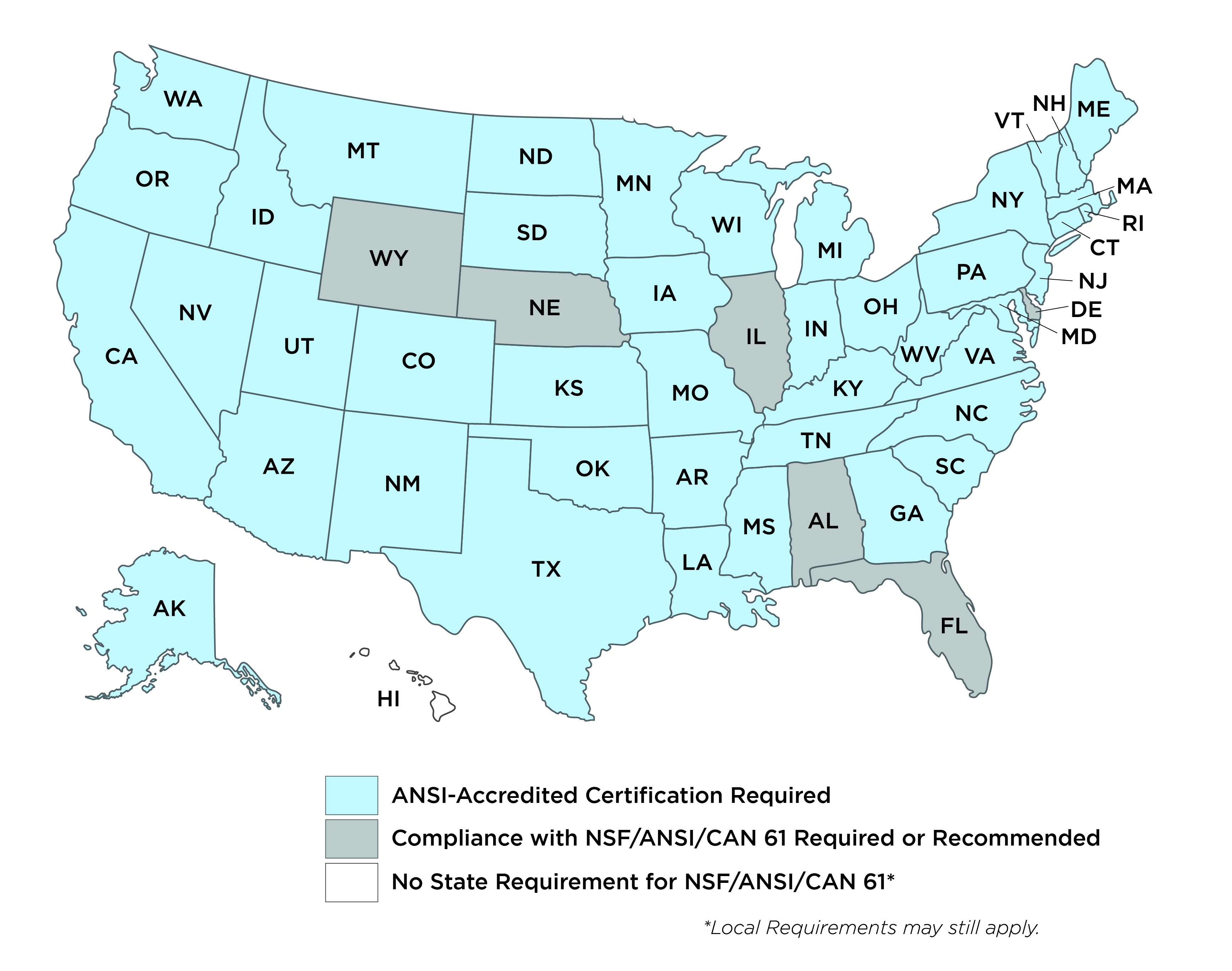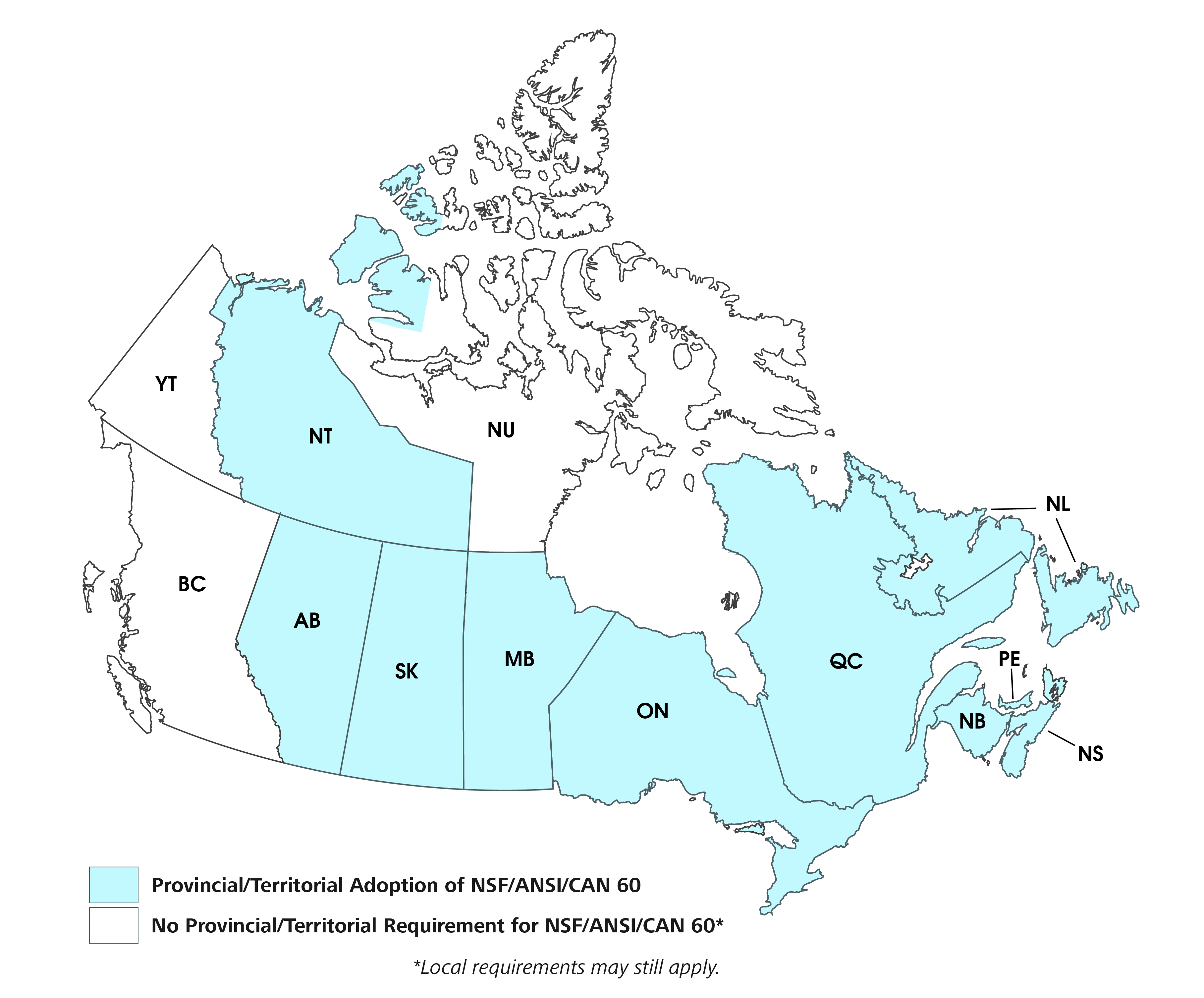Survey of ASDWA Members on Specifications of NSF/ANSI/CAN 60, 61, and 372

Overview
NSF, in cooperation with the Association of State Drinking Water Administrators (ASDWA), conducted a survey of U.S. state drinking water agencies about their recognition and use of the following
NSF/ANSI/CAN standards:
- NSF/ANSI/CAN 60: Drinking Water Treatment Chemicals – Health Effects
- NSF/ANSI/CAN 61: Drinking Water System Components – Health Effects
- NSF/ANSI/CAN 372: Drinking Water System Components – Lead Content
This survey was last updated in 2019. We are always collecting the most updated information on regulations. Have an update to share? Send it to us at watermarketing@nsf.org.
Executive Summary
NSF/ANSI/CAN 60: Forty-nine states have legislation, regulations or policies requiring drinking water treatment chemicals to comply with or be certified to NSF/ANSI/CAN 60.
NSF/ANSI/CAN 61: Forty-nine states have legislation, regulations or policies requiring drinking water system components to comply with or be certified to NSF/ANSI/CAN 61.
NSF/ANSI 223: This standard establishes requirements for minimum inspection frequencies and minimum product testing frequencies for surveillance activities associated with the certification of treatment chemicals. There are requirements for increased surveillance activities for production facilities located in countries where there is significant international perception of corruption. The standard also requires increased audit frequencies for facilities found to have significant variances from the requirements of NSF/ANSI/CAN 60. This standard has not currently been adopted in any U.S. state.
NSF/ANSI/CAN 372: This establishes a standardized methodology for the determination and verification of product compliance with a maximum weighted average lead content requirement of 0.25%. With the exception of those products exempted in the Safe Drinking Water Act of the United States, all products certified to NSF/ANSI/CAN 61 must also be evaluated to the requirements of NSF/ANSI/CAN 372. On September 1, 2020, the U.S. Environmental Protection Agency (EPA) published the final regulation “Use of Lead Free Pipes, Fittings, Fixtures, Solder, and Flux for Drinking Water,” which requires that manufacturers or importers certify that their products meet a 0.25% weighted average lead content for products conveying or dispensing drinking water.
NSF/ANSI/CAN 60 U.S. Compliance Requirements
ASDWA members were asked about each of their state’s compliance requirements to NSF/ANSI/CAN 60: Drinking Water Treatment Chemicals – Health Effects.
The survey found that 49 states have requirements for water treatment chemicals to comply with NSF/ANSI/CAN 60, as shown below. For more specific information by state, see Addendum A below.

States where compliance with NSF/ANSI/CAN 60 is required or recommended: Delaware, Florida, Illinois, Nebraska, Wyoming
No state requirement for NSF/ANSI/CAN 60 (local requirements may still apply): Louisiana
NSF/ANSI/CAN 61 U.S. Compliance Requirements
Drinking water system components fall into two categories of regulation. Centralized water treatment plants and water distribution systems up to and including the water meter are typically regulated by state drinking water agencies. Water distribution systems downstream of the water meter or inside a building are typically regulated by state or local plumbing codes. The information shown in this document applies to products regulated by state drinking water regulatory agencies only. While all major model plumbing codes require the use of NSF/ANSI/CAN 61 certified products, the specific requirements for those product types can be found in state or local plumbing codes. Products certified to NSF/ANSI/CAN 61 also comply with NSF/ANSI/CAN 372 unless specifically exempted by the Safe Drinking Water Act of the United States.
The ASDWA member survey found that 49 states have requirements for water treatment and distribution
components to comply with NSF/ANSI/CAN 61.

States where compliance with NSF/ANSI/CAN 61 is required or recommended: Alabama, Delaware, Florida, Illinois, Nebraska, Wyoming
No state requirement for NSF/ANSI/CAN 61 (local requirements may still apply): Hawaii
NSF/ANSI/CAN 60 Canadian Compliance Requirements
Health Canada conducted a survey of Canadian provincial and territorial drinking water agencies about their recognition and use of NSF/ANSI/CAN 60 and 61.
The survey found 9 of 13 provinces/territories require drinking water treatment chemicals to comply with the requirements of NSF/ANSI/CAN 60: Drinking Water Treatment Chemicals – Health Effects, as shown in the figure below. For more specific information regarding the requirements, please refer to Addendum B.
As of April 2019, NSF/ANSI/CAN 60 is accepted as a National Standard of Canada by the Standards Council
of Canada (SCC), but the previously published version has been widely recognized in Canada for years in the below locations. Some references to the standard may appear as "NSF 60,” “NSF/ANSI 60” or “NSF-60.”

Provinces/territories with no current adoption of NSF/ANSI/CAN 60: British Colombia, Nunavut, Yukon
NSF/ANSI/CAN 61 Canadian Compliance Requirements
In regard to NSF/ANSI/CAN 61, the survey found that 11 of 13 provinces/territories require drinking water system components to comply with the requirements of NSF/ANSI/CAN 61: Drinking Water System Components – Health Effects, as shown in the figure below. For more specific information regarding the requirements please refer to Addendum B. Plumbing products in buildings are regulated through the appropriate plumbing code in Canada.
Most products are required to comply with NSF/ANSI/CAN 61 via references in CSA standards that are referenced in the plumbing codes.
As of April 2019, NSF/ANSI/CAN 61 is accepted as a National Standard of Canada by the Standards Council
of Canada (SCC), but the previously published version has been widely recognized in Canada for years in the below locations. Some references to the standard may appear as "NSF 61,” “NSF/ANSI 61” or “NSF-61.”

Provinces/territories with no current adoption of NSF/ANSI/CAN 61: Nunavut, Yukon
How NSF Can Help You
Get in touch to find out how we can help you and your business thrive.

